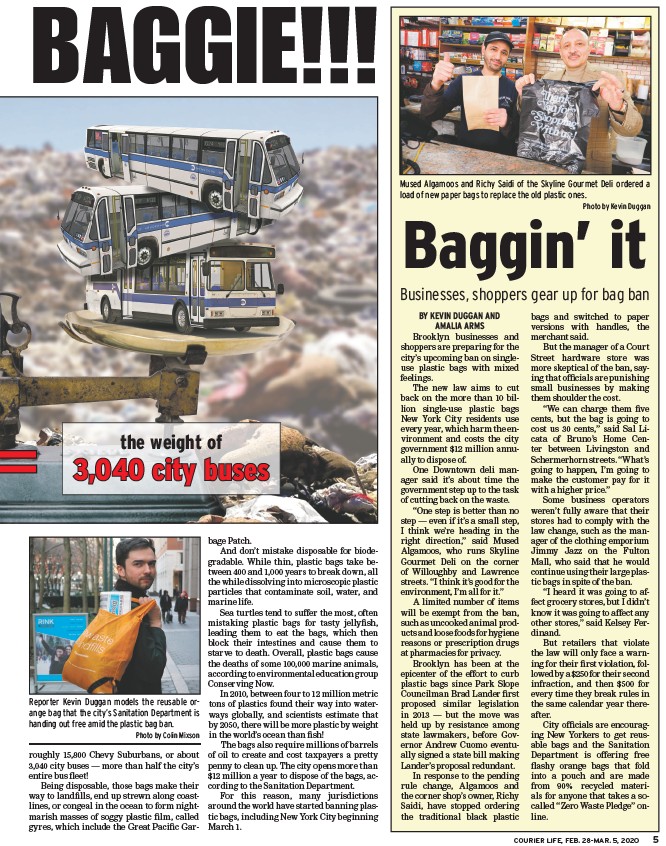
Mused Algamoos and Richy Saidi of the Skyline Gourmet Deli ordered a
load of new paper bags to replace the old plastic ones.
Photo by Kevin Duggan
Baggin’ it
Businesses, shoppers gear up for bag ban
COURIER LIFE, FEB. 28-MAR. 5, 2020 5
BY KEVIN DUGGAN AND
AMALIA ARMS
Brooklyn businesses and
shoppers are preparing for the
city’s upcoming ban on singleuse
plastic bags with mixed
feelings.
The new law aims to cut
back on the more than 10 billion
single-use plastic bags
New York City residents use
every year, which harm the environment
and costs the city
government $12 million annually
to dispose of.
One Downtown deli manager
said it’s about time the
government step up to the task
of cutting back on the waste.
“One step is better than no
step — even if it’s a small step,
I think we’re heading in the
right direction,” said Mused
Algamoos, who runs Skyline
Gourmet Deli on the corner
of Willoughby and Lawrence
streets. “I think it’s good for the
environment, I’m all for it.”
A limited number of items
will be exempt from the ban,
such as uncooked animal products
and loose foods for hygiene
reasons or prescription drugs
at pharmacies for privacy.
Brooklyn has been at the
epicenter of the effort to curb
plastic bags since Park Slope
Councilman Brad Lander fi rst
proposed similar legislation
in 2013 — but the move was
held up by resistance among
state lawmakers, before Governor
Andrew Cuomo eventually
signed a state bill making
Lander’s proposal redundant.
In response to the pending
rule change, Algamoos and
the corner shop’s owner, Richy
Saidi, have stopped ordering
the traditional black plastic
bags and switched to paper
versions with handles, the
merchant said.
But the manager of a Court
Street hardware store was
more skeptical of the ban, saying
that offi cials are punishing
small businesses by making
them shoulder the cost.
“We can charge them fi ve
cents, but the bag is going to
cost us 30 cents,” said Sal Licata
of Bruno’s Home Center
between Livingston and
Schermerhorn streets. “What’s
going to happen, I’m going to
make the customer pay for it
with a higher price.”
Some business operators
weren’t fully aware that their
stores had to comply with the
law change, such as the manager
of the clothing emporium
Jimmy Jazz on the Fulton
Mall, who said that he would
continue using their large plastic
bags in spite of the ban.
“I heard it was going to affect
grocery stores, but I didn’t
know it was going to affect any
other stores,” said Kelsey Ferdinand.
But retailers that violate
the law will only face a warning
for their fi rst violation, followed
by a $250 for their second
infraction, and then $500 for
every time they break rules in
the same calendar year thereafter.
City offi cials are encouraging
New Yorkers to get reusable
bags and the Sanitation
Department is offering free
fl ashy orange bags that fold
into a pouch and are made
from 90% recycled materials
for anyone that takes a socalled
“Zero Waste Pledge” online.
BAGGIE!!!
the weight of
3,040 city buses
roughly 15,800 Chevy Suburbans, or about
3,040 city buses — more than half the city’s
entire bus fl eet!
Being disposable, those bags make their
way to landfi lls, end up strewn along coastlines,
or congeal in the ocean to form nightmarish
masses of soggy plastic fi lm, called
gyres, which include the Great Pacifi c Garbage
Patch.
And don’t mistake disposable for biodegradable.
While thin, plastic bags take between
400 and 1,000 years to break down, all
the while dissolving into microscopic plastic
particles that contaminate soil, water, and
marine life.
Sea turtles tend to suffer the most, often
mistaking plastic bags for tasty jellyfi sh,
leading them to eat the bags, which then
block their intestines and cause them to
starve to death. Overall, plastic bags cause
the deaths of some 100,000 marine animals,
according to environmental education group
Conserving Now.
In 2010, between four to 12 million metric
tons of plastics found their way into waterways
globally, and scientists estimate that
by 2050, there will be more plastic by weight
in the world’s ocean than fi sh!
The bags also require millions of barrels
of oil to create and cost taxpayers a pretty
penny to clean up. The city opens more than
$12 million a year to dispose of the bags, according
to the Sanitation Department.
For this reason, many jurisdictions
around the world have started banning plastic
bags, including New York City beginning
March 1.
Reporter Kevin Duggan models the reusable orange
bag that the city’s Sanitation Department is
handing out free amid the plastic bag ban.
Photo by Colin Mixson